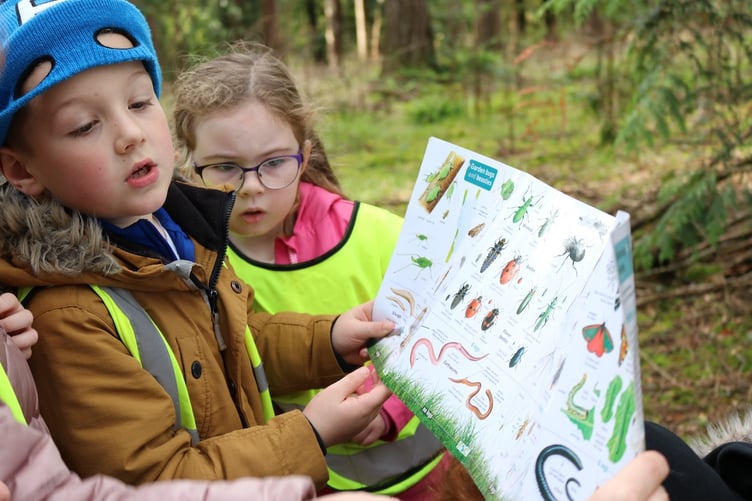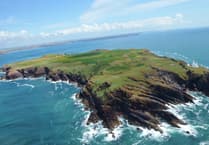One of the UK’s largest environmental education charities, which hosts school residential trips and other courses from three Welsh field centres including FSC Dale Fort in Pembrokeshire, is celebrating its 80th anniversary in 2023.
From an idea conceived in wartime, the Field Studies Council is continuing to equip the eco-guardians of the future to fight for nature.
The FSC welcomed nearly 120,000 learners to its residential and day learning spaces in 2022, with hundreds of thousands more making use of online learning, digital resources and its own wildlife identification charts.
The council was created in 1943 with a vision to connect people with the great outdoors.
Field Studies Council chief executive Mark Castle said:“Our founders had an amazing vision which centred on the need for the UK to have dedicated places where people could study nature and the environment. That they also had the tenacity and determination to get the Field Studies Council up and running during the difficulties and privations of World War II is truly remarkable.
“What was relevant then is just as relevant now: a world emerging from a crisis but knowing that opportunities for everyone to study in and about the natural world are essential. There isn’t a lesson in the school day that can’t be enriched by connecting to nature, or a subject in the curriculum that can’t be enhanced by outdoor learning.
“Independent evaluation and powerful stories tell us, again and again, how valuable and valued the experiences we offer are for learning and improved wellbeing. We want to create not just happy students, but students who are equipped to fight for nature.”
Published this month, the charity’s latest impact report, also shows that:
From September 2021 to August 2022, more than 103,000 learners from schools, colleges and universities took part in outdoor learning at the charity’s day and residential field centres, with more than 40,000 residential stays
In 2022, more than 13,000 adults trained in applied biodiversity skills online and in person at Field Studies Council centres and 22 partner locations
More than 142,000 wildlife guides were used by volunteer recorders, families and professionals
The free resources pages for students and teachers on the Field Studies Council website were visited more than 500,000 times in 2022
Mark added: “Knowledge and understanding of the natural world is more important now than ever before, and we will work tirelessly to make sure that we continue to be a leading player in environmental education and policy.
“This year we have been involved with the new Curriculum for Wales, supported proposals for every Scottish and Welsh schoolchild to experience an outdoor residential, engaged with the Department for Education and ministers over the Nature Park and Climate Leaders Award, helped improve access to nature for everyone, helped make access and connection to nature a central part of England’s national Health and Wellbeing Plan and secured funding for projects through streams like the Heritage Lottery Fund or the Dormant Assets Fund.
“We will continue to make our voice heard as we strive to make sure everyone, regardless of background or personal circumstances, can improve their skills and wellbeing through being outdoors.”

The Field Studies Council has a number of events and projects planned to mark its 80th anniversary, including planting 80 trees at its centres to highlight net zero carbon goals and nature recovery.
Celebrations started with a two-night staff conference and will continue with regional events and activities around the country.
The Field Studies Council is also further developing its Young Darwin Scholarship, which brings together young people with a passion for the natural world who need support and friends to follow their dream.
They have supported and mentored 150 scholars, with 75 new ones created in 2022 – research has shown that most go on to study biodiversity and have related careers as a result of the training and mentoring they receive from the Field Studies Council.
Mark said: “I’m delighted that we will be awarding another 80 Young Darwin Scholarships to mark the 80th anniversary. All of our scholars so far have left the course with more understanding of what environmental career pathways they could follow, while being able to enjoy learning surrounded by like-minded people.
“This year, we have grown and diversified our Young Darwin community by focusing on new locations, neuro-diversity and ethnicity, and we are grateful to our generous donors who have allowed us to make the opportunity available to scholars who would not otherwise have been able to afford the course.”
The pandemic drove home the importance of getting outdoors and engaging with nature – and the Field Studies Council is working harder than ever to make sure everyone gets the opportunity to do just that.
The Field Studies Council is the UK’s leading environmental education charity and runs 14 field centres around the country and additional urban learning locations in London and Birmingham.
Head of education Scott Wycherley said he was excited by the role the charity had to play in helping young people to learn about and enjoy the natural world, but was mindful of the financial pressure schools were under which could squeeze outdoor learning off the timetable.
He said: “Lockdown brought more people back to their natural areas, which was really positive to see. The advantage of getting young people into those environments is huge.

“For the founding members of the Field Studies Council to have had this vision and this legacy about engaging with the environment, was crucial.
“The future is about continuing to work with our partners to make sure outdoor learning experiences are still very much part of the curriculum and bringing all the associated benefits to young people.”
Extensive research confirms that outdoor learning can have enormous positive benefits for children and young people, both in terms of their academic outcomes and their mental health and wellbeing.
Scott said: “We are committed to getting pupils outdoors. Someone joked with me when I left my last job that I was going to see students who had never seen a sheep – and I’ve seen it.
“In 2016, Natural England found that more than one in nine children had not set foot in a park, forest, beach or other natural environment for at least 12 months. That’s scary.
“It’s quite easy for me, I know. I can sit here all day and wax lyrical about outdoor ed and all its benefits, but schools are under really big challenges. Post-covid, I think maybe a little bit of confidence has gone in some places to take groups out. Courses have increased in price, schools’ energy bills are going through the roof and transport costs are on the rise making it really, really difficult. It’s really upsetting to see those barriers.
“I’ve been involved in webinars with teachers, and they are going: “Cost, cost, cost.” I haven’t got the answers, but we want to continue to focus on those high-quality residential experiences, but also offer more day visits, outreach and digital.”
Scott also pointed out that, as a charity, the Field Studies Council can make grants to schools to help reduce the cost of residential field trips. To qualify, schools must have at least 10 per cent of pupils eligible for pupil premium, and the application process is straightforward.
Applications for grants towards field trips in 2024 will open in the autumn.
Scott added: “I think it’s important that we continue to lead the sector and set the standard, focused on high quality residential experience but also increasing those opportunities closer to home with day visits, outreach work and our digital offering, which allows us to increase our reach across many different schools and different areas.
“An education that prepares students for the future is essential, and that has to be balanced – a mixture of knowledge, skills and experiences that allows them to think and to apply their learning.
“Environmental education shouldn’t just sit in geography, or biology, or natural history, but across the curriculum. STEM subjects have got a massive part to play.
“The jobs that young people are going to go into probably don’t exist yet, which is really scary but also really exciting. I think there will be lots of opportunities for young people, and lots of opportunities to take the right path. We are going to need some skilled individuals with a broad, holistic, longer term, bigger thinking than we might have had in the past.
“We want people engaging with the environment on any scale, and fieldwork and outdoor learning is a medium to starting that journey.”
Before joining the Field Studies Council last year, Scott enjoyed a 20-year classroom career as a geography teacher and a deputy head at a school in Shropshire. He made the switch after deciding he didn’t want to take the next step on the teaching ladder.
He said: “It was a really, really difficult decision to leave what I had done and what I was still enjoying to go and find a new sort of challenge.
“It was almost like the stars aligned, and it enabled me to return to geography but also my love of being outdoors. That variety of working for me was so important.
“Also, it was a job that I felt I could make a difference in and have an impact.”
Scott’s role is varied, and includes making sure the charity's field study centres, from the south coast up to Scotland, give consistent and high-quality fieldwork and learning experiences delivered by skilled practitioners.
He has also been involved in developing new courses and resources to make sure the education offered by the Field Studies Council is up-to-date and positively support learning towards GCSEs, A Levels, Highers and other qualifications.
He said: “What stood out for me at the Field Studies Council is the approach to student-led learning. Exam questions have been filtered into the field work, so it’s a complete package.
“I’m super-excited about some of the new products and developments. There is a new natural history GCSE and the Field Studies Council is really looking forward to being involved in that and supporting a brand-new qualification.
“Another part of my role is working with external partners to make sure we’re all working together, sharing expertise, sharing ideas that will ultimately get students outside learning, with all the benefits that brings.
“The best part of my job is the variety of the people I work with, both outside and within the organisation. I have been really impressed by the warm welcome I’ve received within the charity but also how highly regarded the Field Studies Council is by its partners. People want to work with us.
“I’ve been so impressed with the dedication and commitment of the education teams. They throw themselves at anything and will work exceptionally long hours to give the students the best possible outcome.”
The climate emergency is just one reason why effective environmental education is now more important than ever, according to Scott.
He said: “Fieldwork has evolved, and its importance has definitely evolved. It’s the muscle that brings geography together, but we don’t just offer geography. There are biology trips, eco skills and the work we do for adults who are interested in ecology.
“In my lifetime, I’ve seen the seasons change. I remember when summers were summers – you would get your BMX bike out and it was sunny for the whole of August. Wintertime there was snow and proper snow.
“Now, what’s going on with Easter? Easter tends to be like summer now. Our summers are wetter, our winters are milder and we’re giving storms names. We had a record-breaking summer last year and I saw an article that they are expecting 2023 to be the hottest on record.
“Young people have got to notice it and we’ve got to educate them now.
“If we change the weather, the ecosystem will break down, the soil will change, the plants will change, the biodiversity, the animals. These youngsters are going to face further challenges in their lifetime, so we have got to equip them for that.”
Scott said the Field Studies Council had some exciting new projects in the pipeline for 2023.
Scott said: “I’ve only been here a short period of time and I’m really excited about looking forward to what the next 80 years will bring. Technology is going to change, the curriculum is going to change and I think we’re in a very good position to be part of that journey.”
For more information about the Field Studies Council, visit www.field-studies-council.org/




